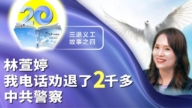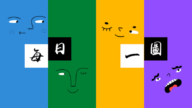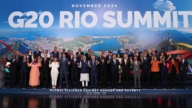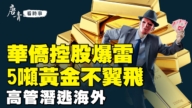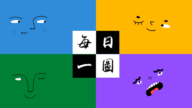【新唐人2013年06月10日讯】6月8号,中共党媒刊登了一篇署名为戴立言的评论文章——《党政制度与反腐败》,声称中共一党制最能解决腐败问题。这已经是戴立言连续3天在中共喉舌媒体刊登类似的评论文章。网友们笑称,最近有个常常大白天说“梦话”的“戴立言”,可能是中共中央某干部的笔名。媒体分析,这些文章中,最值得关注的是官方对网络舆论抱持的漠视、丑化甚至敌视的态度。也有评论认为,中共近期连续的舆论轰炸,只是为一党专政辩护而已。
《政党制度与反腐败》的文章说,不管是一党制、两党制还是多党制,与腐败的发生率和治理效果的关联度不能妄下结论。
时事评论员司马泰认为,文章无非就是想证明腐败并不是由于中共的一党专政带来的,用一种似是而非的混乱逻辑为独裁寻找借口。
时事评论员司马泰:“民主潮流浩浩荡荡,它有一个大的趋势。要在这个趋势当中去寻找国家和民族改革的出路,而不是维护一个旧的体制不变的前提之下,去寻找各种各样的借口。同样是写这篇文章的人,如果哪天大气候一变的话,他同样可以写出一篇来—-民主国家怎么可以更好的遏制腐败,腐败出现了之后怎么能更好的解决腐败。
美国中文杂志《中国事务》总编辑伍凡表示,虽然民主国家不能完全避免贪污现象,但是民主监督机制会很好的发现、制止和惩罚腐败行为﹔相反,中共本身没有纠错机制,而且已经达到整个体制的全面腐烂。
美国中文杂志《中国事务》总编辑伍凡:“多党制可以互相监督,互相轮替。你这做的不好,4年以后我再换一个,让其他党来做。这样就逼着它们自己要改正、收敛。如果不改正、收敛、不防止腐败,老百姓不投你的票了。这是个非常明显的好处。中共一党独裁专政,谁也赶不了我,我不会下台。不需要投票,要怎么做怎么做,怎么贪就怎么贪,你怎么防止贪污呢?
中共总书记习近平上任以来,一连串反腐动作,包括曾经提出“老虎苍蝇一起打”、“把权力关进制度的笼子里”等。甚至,他在中共中央政治局首次发表讲话时,已提出警告,说﹕腐败问题将造成“亡党亡国”。
然而,《新华社》从6月6号起,开始陆续发表“戴立言”的系列文章,文章多在驳斥“中共官员大多是贪官”和“越反越腐”等观点。
另外,文章还语带杀机的指责质疑者“别有用心”,并将社会分裂的原因归咎为民间的网路舆论。
目前,中共当局实施严格的新闻管制,社会真实的声音与矛盾被掩盖,同时,许多严肃的公共话题无法在传统媒体上得到充分有效的辩论,因而,网络媒体,尤其是“微博”,成为中国公众表达的主要领域。
《法国国际广播电台》认为,戴立言的观点和民众的感受完全对立,从逻辑上看也相当荒谬,好比﹕“丑女”将问题归咎于“哈哈镜”。《法广》说,官方抹黑网络舆论,一方面是给自己涂脂抹粉,但,根本上,其实是遮蔽真正问题。
伍凡:“这个贪污是结构性的 体制性的 一个单位中间,10个人其中有1个人不贪污,那9个人贪污就意味着这个人必死无疑,他们就把你整死。逼着你贪污,要么逼着你滚蛋,要么就把你害死。
很多网友都质疑:“这个‘戴立言’到底是谁,又是代谁在立言?”政治观察人士认为,这或许是比所谓的“仲祖文”、“任仲平”等更高级别的化名或谐音,可能是中共政治局级别的舆论导向。
采访/常春 编辑/李明飞 后制/萧宇
Dai Liyan Articles Questioned as Politburo Guidance of Public Opinion
On June 8, the Chinese Communist Party (CCP)
published a commentary article by Dai Liyan.
It was entitled, “Party System and Anti-Corruption”.
It states that the CCP’s one-party system
is the best suited to solve corruption issues.
This is the third day that Dai Liyan published similar
commentary articles on state-controlled media.
Netizens jokingly say that Dai Liyan “daydreams” a lot,
and is possibly a pen name for a cadre of the CCP.
Media highlight the most noteworthy thing
is official attitudes of ignoring, vilifying, and
being hostile toward opinions aired on the net.
Other comments suggest the CCP’s continuous
reporting is trying to justify one-party dictatorship.
The article “Party System and Anti-Corruption” states
that whether it is a one-party or two-party system,
one shouldn’t jump to conclusions about the connection
between corruption and the effect of control.
Political commentator Sima Tai thinks the
article only wants to prove corruption was not
a result of the CCP’s one-party dictatorship.
It tries to find excuses for dictatorship with a confusing logic.
Sima Tai: “Internationally, the trend
towards democracy is becoming larger.
[China] should look for a way for its people to become part
of this trend, and not for excuses to keep the old system.
If the political climate changes someday,
the same author could write something else.
Perhaps, ‘How Well A Democratic Country Can Stop
Corruption’ or ‘How To Solve Corruption In A Better Way’.”
Wu Fan, Chief Editor of the American
magazine “China Affairs”, commented.
Wu says that even if a democratic country can’t
avoid corruption completely, democratic oversight
can detect, stop, and punish corrupt actions.
On the contrary, the CCP doesn’t have a mechanism
to correct itself, and the whole system is corrupted.
Wu Fan: “A multiparty system can
rotate, and supervise each other.
If one party doesn’t do well, another
can take it’s place four years later.
The parties are forced to correct themselves in this way.
If they don’t improve and avoid corruption, people
won’t vote for them. This is a very obvious benefit.
The CCP is a dictatorship. No one can stop it. There’s no
vote. People have to do whatever the CCP tells them to do.
How can you stop corruption?”
The CCP general secretary Xi Jinping has
undertaken a series of anti-corruption actions.
He also raised topics, such as “bring all corrupt
officials to justice, be they big shots or small potatoes”.
Xi also used “keep power restricted in a cage of regulations”,
and even said in his first politburo speech that the issue
of corruption would lead to the destruction of the Party.
It would also lead to national subjugation.
Xinhua News Agency has published
Dai Liyan’s series articles since June 6
They were used to stand against opinions that
“the majority of the CCP officials are corrupt officials”,
as well as “the more anti-corruption,
the more corruption there seems to be.”
The articles also claim that people who
critique the articles have ulterior motives.
It also blames online public opinion for social divisions.
The CCP authorities strictly control the press system.
The truth, and voice of society, have been suppressed.
Many serious public topics can’t be
discussed through traditional media.
Thus, social media, especially Weibo, has become a
major field for Chinese people to express their opinion.
RFI indicates that Dai Liyan’s opinion is against
the people’s opinion. Its logic is very absurd too.
It’s like an ugly person blaming a mirror.
RFI says that the official defames net opinions in order
to beautify the CCP itself, and to cover the true problems.
Wu Fan: “Corruption is institutional and structural. Say
there are 9 out of 10 people who are corrupt in a unit.
The 1 left will be persecuted by the other 9.
They’ll either force you to leave, or kill you.”
Many netizens question “Who is
Dai Liyan, and ho does he represent?”
It may be a higher level pseudonym or homophonic
for names like “Zhong Zuwen” and “Ren Zhongping”.
It may be politburo level guidance of public opinion.




